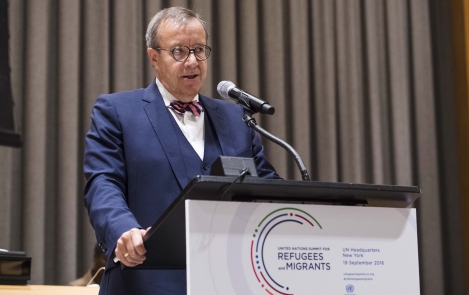-
Reset
+


President Ilves encouraged support for migration agreements with migration pressure countries of departure at the UN Summit for Refugees and Migrants
Tuesday, 20 September 2016 05:30
"The migration crisis concerns a variety of spheres in many countries and affects security, stability and development in several regions all over the world. Co-operation between affected countries is something that will help vulnerable people escape from war and terror, political or social persecution, poverty and hunger," said the President, Toomas Hendrik Ilves, yesterday in New York, at the plenary meeting of the UN migration summit.
The heads of state and leaders of government passed a political declaration at the summit to confirm their shared responsibility for the more effective management of global migration and in helping refugees and migrants.
Representatives of approximately 60 countries, including, for example, the presidents of Finland, Latvia, Egypt, Mexico, Cyprus, Bulgaria and Georgia; the prime ministers of Denmark, Japan and Canada and the ministers of foreign affairs of several countries took part in the summit.
President Ilves welcomed the UN initiative that brought heads of state and leaders of government together for the first time in history to discuss refugee and migration related problems at such a high level under the UN umbrella and in a common key.
"This will provide us with better opportunities to focus on gaps in global solutions to such a highly important issue," stated the Estonian Head of State.
According to the President, it is important for us to deal with the reasons for conflicts, violence and extreme poverty in the countries of departure for migration.
"The new partnership with third countries, as initiated by the European Union, is a step in the right direction. We do believe that migration treaties with countries of departure for migration pressure, which consider mutual interests, will ultimately contribute to a peaceful solution to problems and improve the political, social and economic situation of the populations of many countries," said President Ilves, in defining the position of Estonia.
He emphasised in his address that countries need to make even greater efforts to protect children who are forced to escape from their homelands.
"Today, there are almost 50 million child refugees and migrants in the world. The number of child refugees has almost doubled in only 10 years and will continue to grow. Such a shocking statistical fact requires us to employ the most efficient measures. It is our duty to make the voices of children audible within the migration turmoil and help them to stand on solid ground, offer protection, health care and education – in essence, a normal life," stated President Ilves.
Estonia is paying special attention to the complicated situation of child refugees and migrants and is attempting to strengthen the protection and integration of such children in Europe, including in the sphere of education, health care, social and legal assistance services, and in the promotion of anti-discrimination and xenophobia measures.
The declaration adopted by heads of state and governments yesterday includes four major components: reasons and challenges of migration flows; willingness of countries to share the burden stemming from global migration; principles and obligations with respect to all refugees, incl. migrants; obligations with respect to migrants only and follow-up activities.
According to the UN, there were a total of 244 million refugees in the world in 2015, including approximately 40 million internal refugees and 20 million migrants. The total number of refugees has increased within 15 years by approximately 70 million people or by 40%. 104 million of today's refugees (43%) are born in Asia, 62 million (25%) in Europe. Africa ranks fifth in the list of places of origin for migration (34 million or 14%).
In 2015, 1,255,600 people applied for international protection from the European Union. Within the first eight months of 2016, 304,993 refugees have sought refuge in Europe. Within the framework of the European migration programme, Estonia has today received 60 refugees, incl. 49 refugees relocated from Greece and 11 refugees relocated from Turkey.
Office of the President
Public Relations Department



